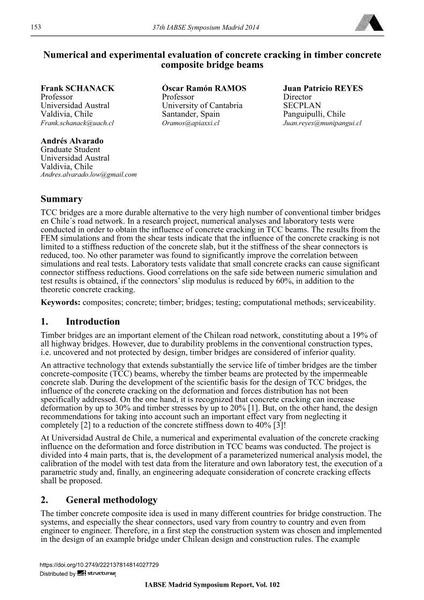Numerical and experimental evaluation of concrete cracking in timber concrete composite bridge beams

|
|
|||||||||||
Détails bibliographiques
| Auteur(s): |
Frank Schanack
Óscar Ramón Ramos Juan Patricio Reyes Andrés Alvarado |
||||
|---|---|---|---|---|---|
| Médium: | papier de conférence | ||||
| Langue(s): | anglais | ||||
| Conférence: | IABSE Symposium: Engineering for Progress, Nature and People, Madrid, Spain, 3-5 September 2014 | ||||
| Publié dans: | IABSE Symposium Madrid 2014 | ||||
|
|||||
| Page(s): | 153-160 | ||||
| Nombre total de pages (du PDF): | 8 | ||||
| Année: | 2014 | ||||
| DOI: | 10.2749/222137814814027729 | ||||
| Abstrait: |
TCC bridges are a more durable alternative to the very high number of conventional timber bridges en Chile´s road network. In a research project, numerical analyses and laboratory tests were conducted in order to obtain the influence of concrete cracking in TCC beams. The results from the FEM simulations and from the shear tests indicate that the influence of the concrete cracking is not limited to a stiffness reduction of the concrete slab, but it the stiffness of the shear connectors is reduced, too. No other parameter was found to significantly improve the correlation between simulations and real tests. Laboratory tests validate that small concrete cracks can cause significant connector stiffness reductions. Good correlations on the safe side between numeric simulation and test results is obtained, if the connectors’ slip modulus is reduced by 60%, in addition to the theoretic concrete cracking. |
||||
| Mots-clé: |
béton ponts
|
||||
